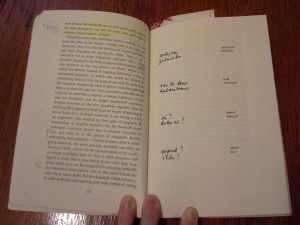
As a literary theorist and semiotician, Barthes writes a lot about signs, and reading his work always gets me excited about the ways we as writers, readers, and humans construct meaning. So although this book contains interesting observations about Japan, it was the meta-level reading that really interested me.
Layers of Meaning Across Languages
One of the first things I noticed when opening this book, is that it had been heavily annotated by its previous owner, Nobuko Yamasaki, a Japanese student at Cornell. What should have been clean white pages with black type were instead highlighted in yellow and underlined in various colors of pencil and pen. And there were notes scribbled in the margins. In Japanese.

As I added my own notes to the pages, all I could think about was how much Barthes would love this. Here was a book about Japan, written in French, translated to English, and then Nobuko translated some of the more difficult words back into her language. In three separate language we are using characters to assign meaning to words that then assigned meaning to a culture. And Nobuko’s notes were making me reconsider not only Barthes’ observations and the translation, but my own language as well. When she circles “infinite” and writes “So many negative words,” I see a prefix I had never even considered.
When I found reproductions of Barthes’ own translational notations reproduced inside the book, I felt a kinship for him–that Barthes, Nobuko, and I were all on equal footing in this world as we tried to make meaning and expand our understanding of the world.

I thought about the connotations of words that would be lost and gained as they were translated across all these cultures and languages, and the richness of that experience made me happy. Of course some meaning would be lost along the way, but an equal amount would be gained. A real linguistic nerd (I’m only a pseudo nerd in this area) could tell you about how the imprints the writer, translator, and readers left as we transformed objects into language are affected by our respective cultures. It’s a conversation I wish I could have with Barthes.
On Japan and Japanese Culture
Living in the Pacific Northwest of the United States, I feel like I am surrounded by Japanese culture and that I understand it. Aside from Narita Airport, I haven’t actually been, but I am surrounded by friends who have (my mom just got back from Japan a few weeks ago) and the imprints of Japanese culture from decades of immigration on Seattle abound. Reading this book, I realized that I wasn’t actually as familiar with Japanese culture as I thought I was. By looking at the country through the eyes of a Frenchman, I realized I was only familiar with other people’s interpretations of the culture. I’ve traveled enough to know that cultural understanding grows with time and direct experience, and I was grateful for that reminder.
Of course, Barthes can only recount the Japanese culture through his own eyes as well, but I found from reading his thoughts on everything from Japanese architecture to the way gifts are packaged and exchanged, I learned more about my own slanted and limited views.
Haiku
“Haiku reproduces the designating gesture of the child pointing at whatever it is (the haiku shows no partiality for the subject), merely saying: that! with a movement so immediate (so stripped of any mediation: that of knowledge, of nomination, or even of possession) that what is designated is the very inanity of any classification of the object… in accordance with the spirit of Zen” – Roland Barthes, Empire of Signs
Haiku is a form I’ve been increasingly interested in as I write more poetry. By looking at this form from a linguistic perspective, Barthes helped me understand the construction and how to write better. He showed me that I was trying to express deep emotion in a form that might not be suited for it. That doesn’t mean I won’t try, but it does change how I will play with the language.
Because of the inability to strip out our inherent cultural views, I did find myself doubting some of Barthes’ interpretations, but it doesn’t matter, because I can learn from the way he approaches the subject. I simply have to remember that we all have our cultural frames that we bring with us and not blindly accept the teachings of others as I sometimes want to do.
I realize I have told you little of the book itself. That is intentional. Although I think Barthes would have enjoyed the idea of the extra layer of meaning a reviewer adds to the work by interpreting it, I also think I’m too far from the text. Although the meaning would not get watered down (one thing I’ve learned from Barthes is that meaning like energy doesn’t dilute, instead it changes). I can signify the book, but I cannot represent it.
If you want to return to the source material, pick up a copy of Empire of Signs from Bookshop.org. Your purchase keeps indie booksellers in business and I receive a commission.





This is the perfect presentation of this book, Isla. It’s like a haiku too, pointing at this book: look! in an immediate fashion, without any classification, and I get a vivid image and the desire to go see for myself. Wonderful.
Thank you, Roxana! That means a lot to me 🙂
I had to read the quote about haiku three times before I understood it. And then I thought–aahh! — in the same way I would think “aahh!” after reading a great Haiku.
Ann, I felt the same way. Not a book to be scanned, no matter how hard I tried 😉
Meta indeed. I love when I interact with a book on as different (and unintended) level. To me, that’s the sign of great writing.
I couldn’t agree with you more. I thought of you and your layers of cultural experience as I read this book.